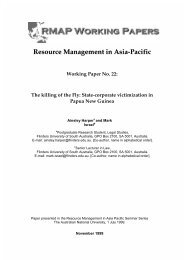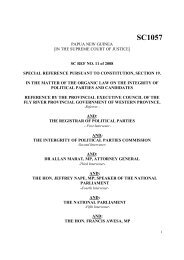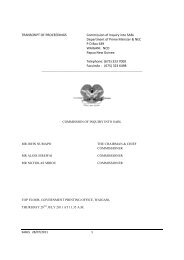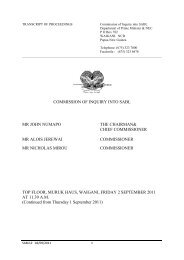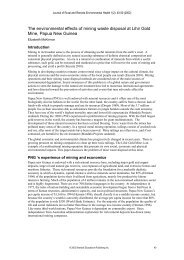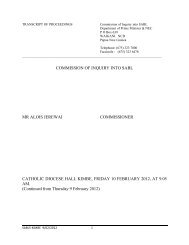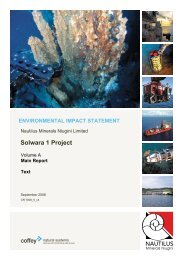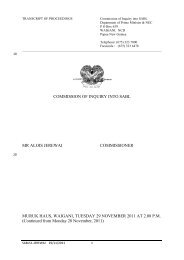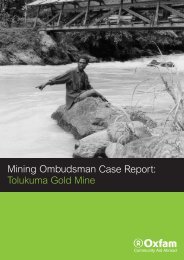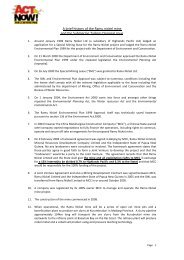Fishy business. The Social Impact of SST.pdf - Act Now!
Fishy business. The Social Impact of SST.pdf - Act Now!
Fishy business. The Social Impact of SST.pdf - Act Now!
Create successful ePaper yourself
Turn your PDF publications into a flip-book with our unique Google optimized e-Paper software.
noted most reasonably that the skills required by the work <strong>of</strong> supervisor are easily found in thePNG workforce, and that these expatriates may be taking jobs away from Papua new Guineans.<strong>The</strong>re are no company policies with regard to unions, but our understanding, from aconversation with Ian Boatwood, is that they are discouraged. Those individuals ‘callingthemselves’ union organizer but lacking any IPA registration have been aggressivelydiscouraged, indeed prohibited entry to the plant on some occasions. This is in keeping with anAmerican anti-union ethos, but may be an unnecessarily aggravating factor to community andemployee relations here.A general point here is that management has made some complacent and condescendingassumptions about the local workforce, particularly the women. <strong>Now</strong>here has it been averredthat the women would not be earning a living were they not employed by <strong>SST</strong>. Our researchleads us to assume most <strong>of</strong> them would be working in the informal economy in some way oranother, whether at roadside markets or with cash crops or small <strong>business</strong>es, and most probably,in so doing, earning far more than their income at <strong>SST</strong>. Our conclusion can only be that thesewomen are sacrificing viable livelihoods for the opportunity to work in a wage-earningcapacity, believing a pay packet to be the superior form <strong>of</strong> income. Some women in outlyingsettlements were, indeed, spending more on their transportation to and from the factory thanthey actually brought home in a fornight. It wasn’t long before these workers simply didn’treturn, which led company management to believe that Sepik women have a general problemwith attendance, a lack <strong>of</strong> commitment or follow-through on the job. Inevitably, this reaffirmedthe original assumptions about the workforce and bolstered the management’s sense <strong>of</strong> pridethat they were indeed training the Wewak people to learn better workplace habits, molding aresponsible workforce out <strong>of</strong> what had once been an idle, perhaps even social lax, urbanpopulation. One <strong>of</strong> our researchers was also told by a hospital employee (a PNG woman infact) that the 600 women working in the factory at any shift is socially beneficial because itlowers rates <strong>of</strong> prostitution in town. After all, what else would these women be doing if theyweren’t loining fish?That brings us to the sex trade. Despite the suggestion above, most prostitution in the the fishingindustry occurs in and around the fishing vessels, where women are lured aboard by workerswanting to trade sex for cigarettes, liquor and, ironically, for bycatch fish. Whereas in Madangwe found a regular market has been established by local women selling fruits and vegetables tothese ships, in Wewak this is not quite as institutionalized, and women are more likely to boardthese ships for sex than garden sales. Meni villagers also go out occasionally to seel foodstuffsto the crews, who give them biscuits, cigarettes and alcohol in return. Village women complainthat they are asked for sex and even <strong>of</strong>fered money and bribes for it.A young man told us:I earn my living by fishing from the sea. I catch enough for consumption every day, butsometimes I trade with the Chinese from the ship. I trade ripe bananas, pawpaw, kina shelland also bunches <strong>of</strong> brus tobaccos for things like fish, hardstuff (alcohol), white smoke(imported cigarettes) and also pornography CD and magazines. Do the Chinese ask fordrugs? Yes <strong>of</strong> course they ask for drugs (marijuana) to trade for hard stuff. What happenswhen you don’t have drugs to trade with them? I used to be forced by the Chinese to sellsex in order to get what I want from the Chinese on the ship.Others told us again and again that women trade fruits for fish, and sex for fish, or for money orthe liquor called ‘hot stuff.’ And they do this on ships <strong>of</strong> all flags, which sailors from Korea,Taiwan, and the Philippines.12



